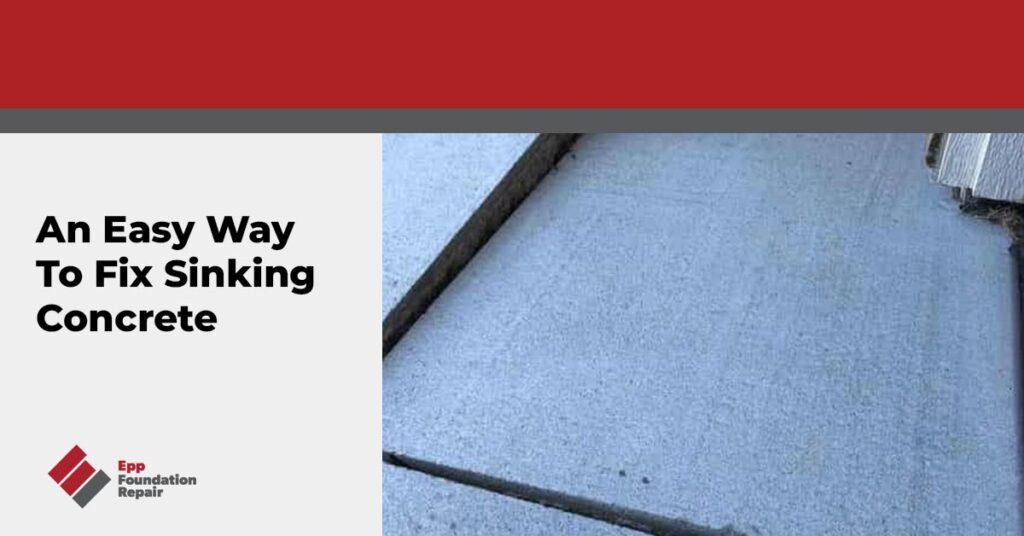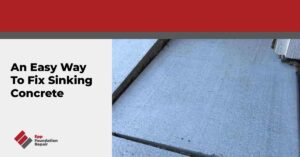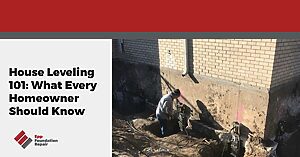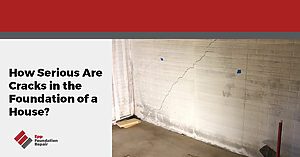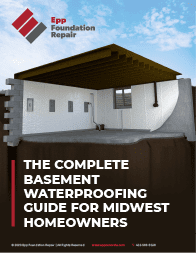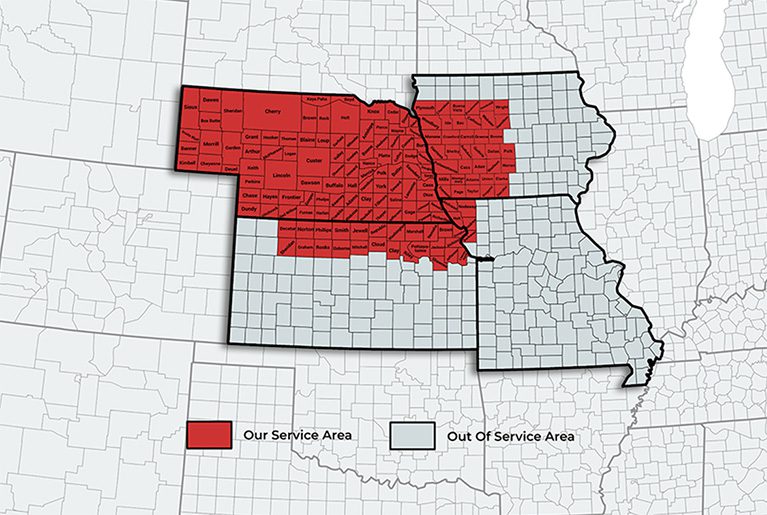Are you tired of tripping over uneven sidewalks (or patios or driveways!) due to concrete sinking or settling? If so, there’s an easy fix: Polyurethane foam injection. It can level an uneven concrete slab in no time flat. Most concrete leveling jobs take only a few hours tops, and then the slab is ready for use again. Read on for more information about how polyurethane foam injection works.
For more information, see, Frequently Asked Questions About Concrete Leveling.
Why Do Concrete Slabs Sink And Become Uneven?
Concrete slabs such as sidewalks, driveways, patios, and pool decks sink and become uneven for various reasons, including the following:
- The soil wasn’t adequately compacted before the slab was poured – Soil needs to be tamped down before a slab gets poured on top of it. If this isn’t done correctly, the slab will settle into the ground after it’s poured and become uneven. It could even crack.
- There’s erosion-prone soil beneath the slab – Some soil types are prone to erosion. This, along with poor drainage, could cause voids to form under the slab. If the slab sinks into the soil, it will probably become uneven.
- The slab is sitting on expansive soil – Expansive soil contains a high percentage of clay, and because of this, it expands as it soaks up moisture and then shrinks as it dries out. This swelling/shrinking cycle – usually seasonal – causes movement in the ground under the slab and can, over time, cause it to sink and become uneven.
- Invasive tree roots – You’ve probably seen many examples of tree roots pushing up on a slab and causing it to become uneven.
Why You Don’t Want An Uneven Concrete Sidewalk, Driveway, etc.
An uneven concrete sidewalk or driveway isn’t just unsightly. It can also be a safety hazard. If someone trips, falls, and gets injured, you could find yourself facing an unpleasant lawsuit. Uneven driveways can even damage tires and vehicles. Therefore, it’s essential to level uneven concrete surfaces as soon as possible.
The good news is that uneven concrete slabs aren’t difficult to level. A professional concrete contractor can use polyurethane foam injection to level most uneven slabs in just a few hours, leaving you with a smooth and safe surface. So, don’t wait until someone gets hurt or your car gets damaged before taking action. Contact a foundation repair contractor with experience using polyurethane foam to level uneven slabs today to ensure your sidewalks, driveways, and other surfaces are even and safe to use.
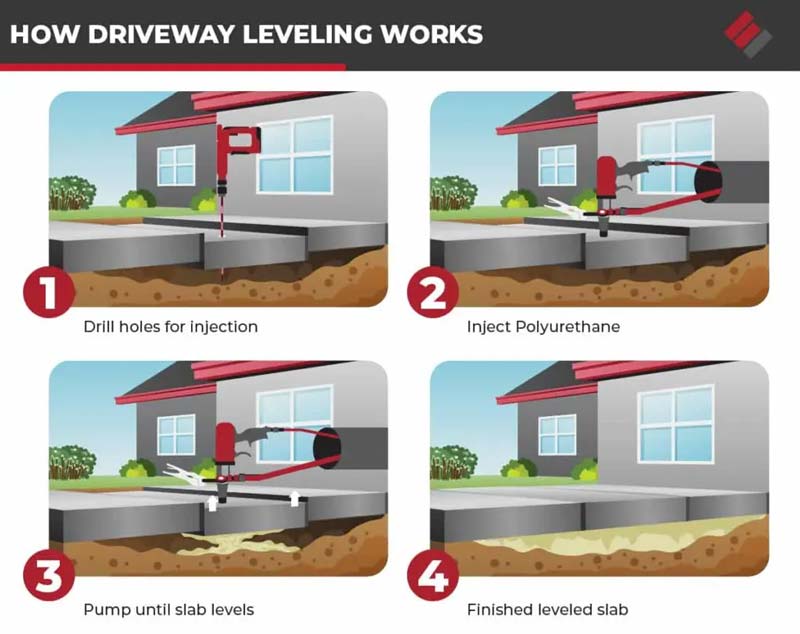
How To Fix Sinking Concrete Using Polyurethane Foam Injection
Polyurethane foam injection involves injecting a polyurethane foam under the affected area, which expands to lift the concrete back into place. The general procedure is as follows:
- First, small, dime-sized holes are drilled into the affected slab.
- The polyurethane foam is injected under the slab through the holes. It immediately begins to expand, and as it does, this raises the sunken slab.
- The holes are then patched using a compound that closely matches the color of the concrete.
- Fifteen minutes after the repair is complete, the slab is ready for use.
Not only does leveling sinking concrete via polyurethane foam injection take less time and money than tearing up the slab and pouring a new one, but it also requires minimal disruption to the surrounding area, making it ideal for commercial or residential properties. Plus, the foam is water-resistant, and because it’s extremely lightweight, it won’t add additional weight to soil that might already have trouble supporting the slab. So, don’t let sinking concrete be a headache any longer – with polyurethane foam injection, you can fix the issue quickly and easily.
For more information, see Concrete Lifting Foam Beats Mudjacking Hands Down For Fixing Uneven Slabs.
How Much Does It Cost To Fix Sinking Concrete?
If you’re dealing with sinking concrete, you’re probably wondering about the cost of fixing it. And the truth is, it depends on a few factors:
- The first thing to consider is the extent of the damage. Is it a small, localized area, or are multiple sections of your concrete sinking?
- Where do you live? The cost to raise sinking concrete will depend on your geographical location. Some areas are more expensive than others.
You’ll also want to consider the cause of the sinking. Is the concrete slab sinking due to improper installation, settling soil, or water damage? Solving the problem for good might involve more than just raising the slab.
The only way to know how much it will cost to fix your sunken sidewalk or driveway is to contact a foundation repair contractor with experience using polyurethane foam injection and ask for an evaluation and repair estimate. Fixing sinking concrete is essential for both safety and curb appeal, so it’s an investment worth making.
Is It Better To Fix Or Replace The Sunken Slab?
Tearing up and replacing an uneven sidewalk, driveway, pool deck, patio, etc., usually isn’t necessary unless the slab is severely damaged. Polyurethane foam injection can, in most cases, repair the sunken slab.
How To Prevent A Concrete Slab From Sinking
As a homeowner, it’s important to be proactive in preventing your concrete slab from sinking. There are a few simple steps you can take to help ensure that your sidewalk or driveway (or any other type of slab) stays level:
- First and foremost, before a slab gets poured, make sure the soil underneath the slab has been adequately compacted. Loose soil can cause the slab to shift and sink over time.
- Consider installing a drainage system to prevent water from pooling underneath the slab. Standing water can weaken the soil and cause the slab to sink. If the soil is prone to erosion, poor drainage can wash away soil, causing voids to form under the slab.
- Finally, hire a professional to seal any cracks in the slab to prevent water from seeping in and further destabilizing the soil.
By taking these preventative measures, you can rest easy knowing that your concrete driveway, sidewalk, patio, pool deck, etc., will remain stable and secure for years.
If you have a problem with sinking concrete on your property, contact us today for an evaluation and repair estimate. Since 1994, we’ve helped clients in Lincoln, Omaha, Kearney, Nebraska, Missouri, and parts of Northeastern Kansas with foundation repair, basement waterproofing, crawl space encapsulation, and concrete leveling for their homes.

